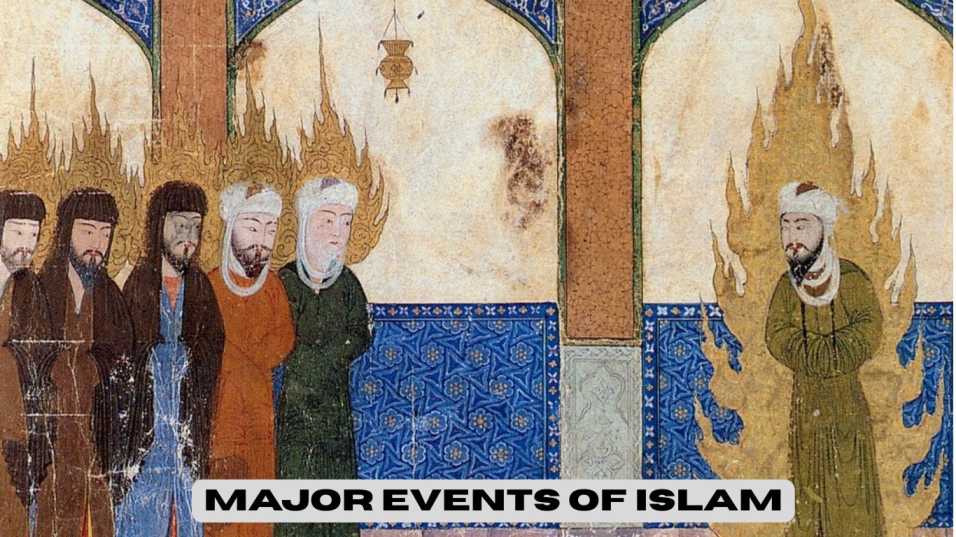When we talk about major events in Islamic history, we’re not just revisiting the past—we’re walking through the legacy of faith, resilience, and divine guidance. From the first revelation to today’s global Muslim presence, these milestones are part of who we are. If you’re looking to connect with your heritage or teach others, this timeline offers a meaningful look into the events that shaped the Ummah.
610 CE: The First Revelation
One of the earliest major events in Islamic history took place in Cave Hira. Here, Prophet Muhammad ﷺ received the first revelation from Angel Jibreel. This marked the beginning of prophethood and the revelation of the Qur’an—a turning point for all of humanity.
“Read in the name of your Lord who created…” (Surah Al-‘Alaq 96:1)

613–622 CE: Makkan Struggle and Steadfast Faith
These years were defined by intense hardship. As the Prophet ﷺ preached Islam in Makkah, the small Muslim community faced oppression. This era is remembered among the major events in Islamic history for the unwavering patience and faith shown by early Muslims.
622 CE: Hijrah—Migration to Madinah
The Hijrah was not just a physical journey—it was a spiritual and political revolution. This migration to Madinah established the first Islamic state, making it one of the most important major events in Islamic history. It also marked the beginning of the Islamic lunar calendar.
624 CE: Battle of Badr
This battle was a divine victory. Outnumbered and under-equipped, the Muslims triumphed. The Battle of Badr showed that faith in Allah and unity could overcome the odds. It remains one of the pivotal major events in Islamic history.
632 CE: The Prophet’s Passing and a New Chapter
The death of the Prophet Muhammad ﷺ marked the end of revelation but the beginning of a new era. His final sermon and message of equality and unity live on. His passing is remembered as one of the emotionally significant major events in Islamic history.
632–661 CE: The Rashidun Caliphate
This was a time of justice, expansion, and administrative excellence. The rightly guided caliphs—Abu Bakr, Umar, Uthman, and Ali (RA)—helped preserve and spread Islam. The compilation of the Qur’an under Uthman (RA) is among the essential major events in Islamic history.
661–750 CE: The Umayyad Dynasty
With rapid territorial expansion from Spain to India, the Umayyads brought Islam to new lands. The construction of the Dome of the Rock in Jerusalem is one of the architectural major events in Islamic history, reflecting Islam’s global rise.
750–1258 CE: The Abbasid Golden Age
This period is often celebrated for its intellectual brilliance. From Baghdad’s House of Wisdom to breakthroughs in medicine and astronomy, the Abbasid era marks one of the cultural and scholarly major events in Islamic history.
1258 CE: Mongol Invasion and Fall of Baghdad
The fall of Baghdad shocked the Muslim world. The Mongols destroyed libraries and massacred scholars. Despite the devastation, many Mongols later accepted Islam. This tragic yet transformative moment is one of the complex major events in Islamic history.
1299–1924 CE: Rise and Reign of the Ottoman Empire
For over 600 years, the Ottomans unified large parts of the Muslim world. The conquest of Constantinople in 1453 was a symbol of Islamic strength. This event, and the empire’s long reign, are widely recognized as monumental major events in Islamic history.
1918–1924 CE: The End of the Caliphate
The dissolution of the Ottoman Empire after World War I led to the abolition of the Caliphate in 1924. This political loss shook the Ummah deeply and is considered one of the most impactful major events in Islamic history of the 20th century.
Mid-20th Century: Independence and Rebirth
Post-colonial independence movements across the Muslim world—like in Pakistan (1947) and Algeria (1962)—brought a renewed focus on identity and faith. These milestones are viewed as modern major events in Islamic history, especially in terms of re-establishing Islamic governance and culture.
21st Century: Global Challenges and Islamic Revival
Today, Muslims face challenges such as Islamophobia and political instability. Yet, there is also a rise in Islamic education, digital da’wah, and renewed interest in Qur’an and Sunnah. These trends are emerging as ongoing major events in Islamic history, shaping the future of the Ummah.
Why These Major Events in Islamic History Matter
Understanding these major events in Islamic history isn’t about glorifying the past—it’s about learning from it. Each event carries lessons in faith, strategy, patience, and community. These historical moments help us make sense of where we come from and how we can grow as a unified Ummah.
“Indeed, in their stories there is a lesson for people of reason.” (Surah Yusuf 12:111)
Final Thoughts
The timeline of major events in Islamic history is more than a list—it’s a living story. Each milestone, whether joyful or painful, shaped the Muslim world into what it is today. As we face the future, this history offers guidance, pride, and a path forward.
Whether you’re a teacher, student, or simply curious, exploring major events in Islamic history can deepen your connection with Islam, boost your understanding, and ignite your sense of identity.
For more blogs Signs of a Healthy Iman and How to Strengthen It -2025

